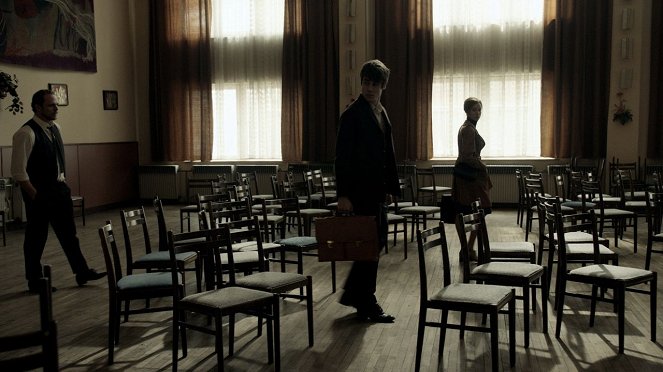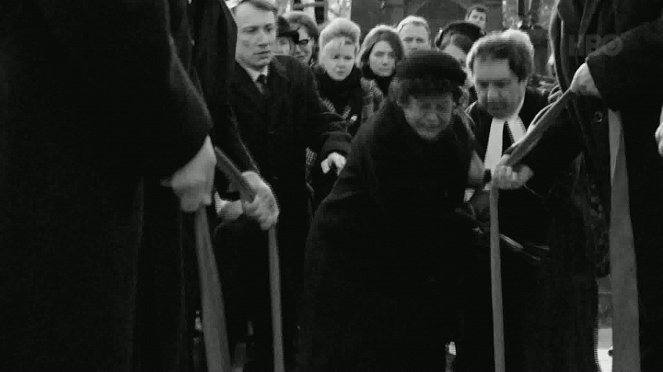Regie:
Agnieszka HollandDrehbuch:
Štěpán HulíkBesetzung:
Táňa Pauhofová, Jaroslava Pokorná, Petr Stach, Igor Bareš, Vojtěch Kotek, Adrian Jastraban, Patrik Děrgel, Ivan Trojan, Jenovéfa Boková, Denny Ratajský (mehr)Inhalte(1)
Am 16. Januar 1969, fast fünf Monate nach dem Einmarsch von Warschauer Truppen in Prag, setzt der Geschichtsstudent Jan Palach am Wenzelsplatz ein Zeichen radikalen Widerstands. Aus Protest über die blutig niedergeschlagene Demokratiebewegung in seinem Land verbrennt sich Palach selbst. Seine Heldentat bringt das totalitäre Regime in Zugzwang. Unruhen drohen auszubrechen. Um Nachahmer abzuschrecken, versuchen die Machthaber Palachs Motive mit allen Mitteln zu verschleiern. (Studio Hamburg Enterprises)
(mehr)Videos (3)
Kritiken (10)
Ein Epitaph der düsteren Vergangenheit der tschechoslowakischen Nation. Der Vergangenheit, die ihr das Lächeln aus dem Gesicht nahm und in die 30 % zurückkehren möchten. Und die für ihre würdevolle Verfilmung einen ausländischen Autor braucht. Agnieszka beweist, dass sie eine gute Dramaturgin ist. Aus dem Film spürt man, dass ihr selbst der Stoff nahegeht. Sorgfältig geschrieben, gespielt und für eine TV-Produktion auch visuell attraktiv. Der Film verdient die große Leinwand. Am meisten fühlte ich mich von dem ersten, menschlichsten Drittel angesprochen.
()
Am Ende habe ich schon ein bisschen gezappelt. Das lag aber am Kinositz. Ansonsten kann ich – ohne zu übertreiben – sagen, dass ich Burning Bush die ganze Zeit (mehr als drei Stunden) regungslos verfolgt habe. So fesselnd war dieses außergewöhnliche Werk. Und heute, einen Tag danach, hat sich an meinen Eindrücken nichts geändert. Wenn ich die Serienversion gesehen hätte, schön eine Folge nach der anderen, hätte ich vielleicht (wirklich nur vielleicht) einige Makel bemerkt, weil ich Zeit gehabt hätte, sie wahrzunehmen. Der Film hat mir aber keine Möglichkeit gegeben, mich auf so etwas zu konzentrieren. Die Schauspieler*innen, die Regie, die Ausstattung… Alles ist auf einem sehr hohen Niveau. Das erste Drittel hat mir am besten gefallen. Der Rest ist aber auch nicht schlecht. Fünf Sterne.
()
Jan Hřebejk hatte wohl bei den Tschechischen Kritikerpreisen Recht, dieses TV-Werk steckt so manchen abendfüllenden Film im Kino in die Tasche. A. Holland hat ihre Meisterschaft unter Beweis gestellt und eine sehr kompakte Miniserie gedreht, wo sie die Kraft der Handlung, die tolle Kamera und die wunderbaren schauspielerischen Leistungen hervorragen ließ. In der Menge der Schauspielstars liegt konkurrenzlos Jaroslava Pokorná an der Spitze, bei einigen Szenen muss es den Zuschauern Stiche versetzen, Táňa Pauhofová spielt die Rolle ihres Lebens, David Novotný und Igor Bareš in den Negativrollen enttäuschen nie, und es überraschten Vojtěch Kotek, bei Ivan Trojan geht man auf Nummer sicher. Nur die Wahl von Martin Huba war nicht ganz mein Fall, dieser sympathische, nette und noble Schauspieler passte mir für die Rolle eines kommunistischen Abgeordneten einfach nicht.
()
Burning Bush is primarily an extremely instructive miniseries, which may not be detrimental in the case of a family melodrama but, in my opinion, it’s not right to consistently lead the viewer in a political drama. I don’t know the reason why a non-melodramatic story would be told with such intensified expressiveness. As if the events after Palach’s self-immolation didn’t have sufficient dramatic potential in and of themselves, drama is created artificially and, on top of that, it is magnified by almost exploitative means. Overacting, tense musical accompaniment, amplified sounds (ideally the screaming of children). The series’ creators underestimate the forcefulness of something as simple as silence. In the second episode, the series slips into horror a few times and, in the third the intense attempt to make the content more attractive culminates in a passionate erotic scene. The bloated drama makes it difficult to distinguish banal events from truly important situations. Everything is taken to the extreme. Always. There is no way to build further tension. ___ The screenplay also suffers from misplaced emphasis, as it focuses on details where they serve no purpose and follows more plot lines than can be satisfactorily developed and taken anywhere in the space of four and a half hours. Carefully studied by Hulík, the historical context here explicitly fights for attention with the personal lives of the protagonists, which ultimately win out (and, for example, the pressure exerted on the Czechoslovak government by Moscow, which feared a shitshow comparable to the events of August 1968 and considered the post-Palach demonstrations to be a manifestation of unstable party leadership, is left out entirely). On the one hand, the series resorts to the use of cheap shortcuts in the depiction of some of the supporting characters (basically everyone except for Burešová) and, at the same time, suffers from an excess of words that either don’t find a more solid place in the overall narrative or are completely unnecessary. An actor’s appropriately chosen look would often have sufficed to express the same thing. Furthermore, the characters speak as if they were in court (i.e. properly and diplomatically), even though they’re not in court. If Holland didn’t want to radically intervene in the screenplay out of a sense of tactfulness, the dramaturg should have taken care of any additional pruning of the script. ___ If the first episode with its all-encompassing greyness and ruination of the oncoming period of normalisation cannot be believed because of its generally overwrought nature, the calmer second episode, with its much more tightly focused narrative, conveys the funereal post-August mood significantly more convincingly, although it works with the highly improbable supposition that there was a sudden turning point after the invasion by Warsaw Pact troops. Almost no one is interested in public events, almost everyone is angry, the level of services is dismal and the food in restaurants is inedible. The streets are teeming with StB agents and cops who never squander an opportunity to harass innocent citizens. Is the depiction of Czechoslovakia as a place that was absolutely unsuitable for normal life really the best way to come to terms with normalisation? The clearly categorised characters are demonstrative of the attempt to promote existing myths rather than call them into question, let alone demolish them. The dehumanisation of the communists, who also have families to feed, comes across as forced. In his film Barbara, Christian Petzold was incomparably more convincing in creating a normalisation-era moral labyrinth in which almost anyone lose themselves. With its natural, clearly conveyed course of events, Barbara is in a number of respects the exact opposite of Burning Bush. ___ The ruin is amplified by the highly professional craftsmanship. The shots are thrown into dark colours, the setting is often a smoky room, the camera captures (or follows) the characters from a distance, often through other objects, with numerous reflective surfaces in the foreground (windows, doors, display cases). Unlike the soundtrack, the documentary-style “inquisitive” (in fact, very carefully thought out) filming does not aggressively push us to adopt a single point of view, but the music and words win out over the images just like the personal dramas triumph over dry factography. Whether intentionally or incidentally, Holland formalistically follows on from the best of the Polish school of moral disquiet, though unfortunately only formalistically and unfortunately only sometimes (mainly in the second episode, which, unlike the other two, deals more with facts than emotions). ___ The non-artistic value of Burning Bush clearly outweighs its actual qualities and its creators undoubtedly have a great advantage in the fact that nothing (more significant) has been made on the given subject yet. It will be up to other filmmakers to try again, differently, and hopefully better. 65%
()
(weniger)
(mehr)
Here the Lord's messenger appeared to him in a blazing fire from the middle of a thorn bush. Moses saw that the bush was on fire but was not consumed. [Exodus, 3.2] The masterful dramatization of events, the echoes of which still haunt us today. Štěpán Hulík chose the most difficult path, examining Palach's act from several angles. He seamlessly transitions from personal testimony to a conspiracy thriller and then to a legal drama, with each having its firmly anchored place in the plot. The way director Agnieszka Holland observes the whole situation is admirable because instead of serving a cheap epitaph of an extreme act, she offers an analytical probe into the era, which primarily calls the nation's conscience into question, a nation known for its very short memory. A multitude of excellent actors (I personally salute Jaroslava Pokorná), a multimillion-dollar budget squeezed to the last drop, and a cinematic event that reminds us that not all films are meant only to entertain us. I can't remember the last time something resonated so strongly within me.
()
Galerie (92)
Photo © Home Box Office (HBO) / Dušan Martinček, Kamil Rodinger



Werbung